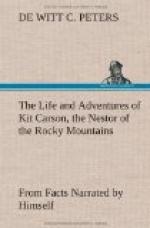On reaching the river, two of the party, Mitchell and New, concluded to tarry awhile in order to gratify their humor for hunting. But Kit Carson, with the remainder of the mountaineers, continued on their course, and, in three days time, were safely lodged within the walls of the Fort. One week subsequently, Mitchell and New followed their companions to the Fort, but in a sad plight. They had not suspected danger, and, consequently, had failed to guard against it. They had been surrounded by Indians and deprived of everything they possessed except their naked bodies. In this denuded state they arrived at the Fort. They were kindly received and provided for by its noble-hearted proprietors; and, for some time enjoyed a respite from all their troubles.
This mountaineer Mitchell, full of eccentricities of character, has seen the ups and downs of a frontiersman during a long and eventful life. He once joined the Camanche nation and became one of their braves.[16]
[Footnote 16: White men have frequently enrolled themselves as warriors among the American Indians; but they have rarely gained the full confidence of the Indians, who, naturally very proud of their birthright, view with a jealous eye all intruders.]
In this capacity he won great renown by the efficient and active part he took in several engagements between the tribe of his adoption and their enemies. His real object in turning Indian was to discover the locality of a gold mine which was said to have an existence in some of the mountains of northern Texas. Having convinced himself that the story of the gold mine, like many of the tales and traditions which gain currency in Indian countries, was entirely without foundation, Mitchell, with some plausible excuse, bid his red friends good bye and sought out his old comrades, the trappers, to whom he ever afterwards proved faithful. About two years since, Mitchell paid a trading visit to the States. On his route, it became necessary that he should pass over the Kansas Territory, just at a time when political difficulties there were exciting the people to the highest pitch of anxiety. The consequence was, that his views upon the all-absorbing questions at issue were frequently asked for by members of both parties. To all these queries he invariably replied, professing his ignorance of everything that appertained thereto. This caused him to be regarded as a dangerous man, and one not to be trusted. He was accordingly treated with indifference and silent reserve. This to a mountaineer, who, during a long period of years, had met every “pale face” as a brother, was insupportable usage. In all haste he finished his business, relinquished his contemplated journey through the States, and started to return to his home in New Mexico. While upon the road, he accidentally fell in with a friend; and, in reply to the question, where have you been? said:




